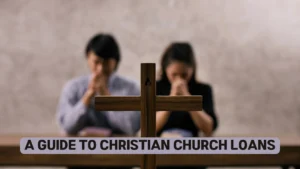When a church needs financial assistance, whether it is to fund a building project or to cover operating expenses, it may decide to apply for a church loan. But who exactly is responsible for signing on behalf of the church? Obtaining a church loan involves several key steps, and understanding who is involved in the signing process is fundamental.
Who signs for a church loan? The first step in obtaining a church loan is to complete an application. This application typically requires detailed information about the church’s financial history, including income and expenses, assets and liabilities, and any existing debts. The application may also ask for details about the purpose of the loan and how the funds will be used. Once the application is completed and submitted, it will be reviewed by the lender.
After the application is reviewed, the lender will assess the church’s ability to repay the loan. These often include evaluating the church’s financial statements, credit history, and fundraising efforts. The lender will also consider any additional conditions that may need to be met before approving the loan. These conditions could include providing additional collateral or obtaining insurance coverage.
Securing funding through a church loan can be vital when a religious organization decides to embark on new projects or needs to address essential repairs. However, as with any form of borrowing, the question of who is authorized to sign on the dotted line must be answered. Given the nature of the institutions involved, church loans present a unique set of circumstances, typically wrapped in layers of governance and stewardship.
This post will reveal the individuals authorized to sign for a church loan by reviewing the specific positions and duties within a church’s hierarchy that establishes the legal and ethical capacity to bind the church to a financial commitment. Comprehending the intricacies of which individuals, such as the pastor, treasurer, board member, or designated trustee, possess the authority to approve on behalf of a congregation is of utmost importance in upholding any religious institution’s integrity and financial well-being.

Who Signs For A Church Loan? Discover The Process
Understanding who is authorized to sign for a church loan is essential for maintaining the integrity and financial security of the religious institution. Typically, the signatories for a church loan are individuals who hold leadership or trustee positions within the church’s organizational structure. These individuals are usually elected or appointed to manage the church’s affairs and assets, reflecting trust and responsibility within the community. It is common for a church’s bylaws or constitution to outline the exact protocol for such financial transactions, ensuring a clear process is followed for any borrowing activity.
Before signing, these representatives must have the backing of the church body, often requiring a formal vote or meeting to confirm the decision to take on debt. This collective agreement is crucial, not only for legal and financial reasons but also to uphold the principles of accountability and transparency within the church. It is important for any church considering a loan to seek legal counsel to ensure all actions comply with state and federal laws and the church’s governing documents. This step helps protect the signers and the church’s financial well-being, ensuring the loan process is conducted ethically and prudently.
Definition of a church loan (who signs for a church loan)
A church loan is a type of financing specifically designed for religious organizations. It is typically obtained by churches or other non-profit organizations to fund projects such as renovations, expansions, or purchasing property. Unlike traditional loans, church loans often have specific terms and conditions that cater to the unique needs of religious organizations.
It is worth noting that church loans are often long-term or short-term and may require a repayment plan that aligns with the organization’s fundraising efforts. This means that the church may need to engage in fundraising activities to generate the necessary funds to repay the loan within the agreed-upon timeframe. Therefore, those signing for a church loan should also have a plan to ensure that the loan can be repaid without putting undue financial strain on the organization.
Purpose of a church loan
A church loan serves a crucial purpose in financing the construction or renovation of a religious facility. Churches often require funding to expand their existing premises or build new ones to accommodate a growing congregation. This is where a church loan comes into play, providing the necessary financial support for such projects. These loans are typically structured as commercial mortgages, allowing churches to secure the funds needed to embark on construction plans. By obtaining a church loan, religious organizations can fulfill their mission of providing a place of worship and community gathering for their members. These loans can also help churches expand their outreach programs and enhance their ability to serve the community.

What to Consider When Signing on Behalf of a Church
When signing on behalf of a church, several important factors must be considered. Firstly, it is crucial to understand the church’s financial projections and budget clearly. This will help ensure that any commitments align with the church’s financial capabilities. Additionally, it is important to carefully review any contracts or agreements related to construction projects or renovations. This can be a challenging task as various categories of work may be involved, such as electrical, plumbing, or structural. Taking the time to review these contracts thoroughly will help protect the church from any potential legal or financial issues down the line. Overall, signing on behalf of a church requires careful consideration and attention to detail to protect the church’s best interests.
Conclusion
In conclusion, signing on behalf of a church for any financial agreement, including loans, demands a high level of due diligence and responsibility. Individuals entrusted with this task must be fully versed in the church’s budgetary constraints, long-term financial plans, and the terms of the agreement being entered. All contracts must be observed for compliance with regulatory requirements and the church’s ability to meet its obligations without overextending its resources. A comprehensive risk assessment should be conducted to safeguard the church’s assets and its congregation’s trust. Finally, seeking expertise from financial advisors or legal counsel when necessary is recommended to ensure all actions taken are in the church’s best interest and further its mission.
By approaching the signing process with an informed and strategic mindset, church representatives can make sound decisions that will benefit their community for years.
Frequently Asked Questions
Who is typically responsible for signing a loan on behalf of a church?
When a church decides to take on a loan, identifying the person authorized to sign the loan documents is a crucial step in the process. Typically, this responsibility falls on an individual who holds a key leadership position within the church's governance structure. This person is often the church treasurer or a board of trustees member. Their role includes not only signing but also ensuring that the loan agreement aligns with the church's financial policies and has the express approval of the church's governing body, such as the vestry or elders, depending on the church's denomination and governance model.
Can a single individual sign a church loan, or must it be a group decision?
When determining the party responsible for signing a church loan, the protocol often hinges on the religious organization's specific governance structure and bylaws. Typically, a church loan should not be signed by a single individual due to the collective responsibility and the significant financial implications involved. Instead, such a financial commitment is usually made by a group decision, typically involving the church's board of trustees or a similar governing body. This ensures that the decision to take on debt is made with due diligence and reflects the consensus of the leadership, thereby safeguarding the church's financial health and aligning with its organizational integrity. Before any agreement is executed, the church must seek legal counsel to ensure compliance with state regulations and internal policies. This careful approach to financial decisions is a best practice for churches and any organization seeking to maintain financial stewardship and accountability to its members.
What qualifications or positions must an individual hold within the church to be authorized to sign for a loan?
For an individual to be authorized to sign for a church loan, they generally must occupy a key position of trust and responsibility within the church's governance structure. This is often a member of the church's finance committee, the treasurer, or another high-ranking office member, such as a trustee. The church's bylaws or constitution typically empower these individuals to enter into financial agreements on behalf of the congregation. It is crucial that the appointed signatory clearly understands the church's financial health and the loan terms, in full alignment with the church's mission and fiduciary obligations.
To ensure due diligence, many churches also require a formal resolution by the board or congregation that authorizes the specific individual to act as the signatory for the loan. This adds a layer of accountability and formalizes the authorization process in the church's records. It is worth noting that while specific titles may vary across denominations and individual churches, the common thread is that the authorized individual must have the backing of church leadership and, in many cases, the endorsement of the church membership at large.







